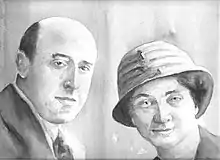The Lord Shepherd | |
|---|---|
 George Robert Shepherd, 1st Baron Shepherd and his wife, Ada | |
| Chief Whip of the House of Lords Captain of the Honourable Corps of Gentlemen-at-Arms | |
| In office 18 October 1949 – 5 November 1951 | |
| Prime Minister | Clement Attlee |
| Preceded by | The Lord Ammon |
| Succeeded by | The Earl Fortescue |
| Deputy Chief Whip of the House of Lords Captain of the Queen's Bodyguard of the Yeomen of the Guard | |
| In office 6 July 1949 – 18 October 1949 | |
| Prime Minister | Clement Attlee |
| Preceded by | The Lord Walkden |
| Succeeded by | The Lord Lucas of Chilworth |
| Lord-in-waiting Government Whip | |
| In office 14 October 1948 – 6 July 1949 | |
| Prime Minister | Clement Attlee |
| Preceded by | The Lord Lucas of Chilworth |
| Succeeded by | The Lord Kershaw |
| Member of the House of Lords Lord Temporal | |
| In office 28 June 1946 – 4 December 1954 Hereditary Peerage | |
| Preceded by | Peerage created |
| Succeeded by | The 2nd Lord Shepherd |
| Personal details | |
| Born | George Robert Shepherd 19 August 1881 |
| Died | 4 December 1954 (aged 73) |
| Political party | Labour |
| Spouse | Ada Newton (m. 1915) |
| Children | 2 |
George Robert Shepherd, 1st Baron Shepherd PC (19 August 1881 – 4 December 1954), was a British Labour politician.
Early life
Shepherd was the son of George Robert Shepherd, a tailor of Spalding, Lincolnshire. Shepherd began working as an assistant to a cobbler in Bradford, joining a union and, in 1903, also joining the Independent Labour Party (ILP). From 1908, he spent a year working as the full-time ILP organiser for the Midlands, and was then appointed as an agent for the Labour Party in Dundee, where he was election agent for Alexander Wilkie. In 1913, he moved to Blackburn, to serve as agent for Philip Snowden.[1]
He did not serve in the First World War, being a conscientious objector.
Career
In 1920, Shepherd became Labour Party District Organiser for the London and Southern area.[1] He served as Assistant National Agent for from 1924 to 1929 and National Agent from 1929 to 1946. This meant he was in charge of the Labour Party agents nationwide at the landslide election victory which brought Clement Attlee to No. 10. The Member of parliament for Blackburn was the senior Labour Party politician Sir Stafford Cripps, a post war Chancellor of the Exchequer and this position must have been important to his career in The Labour Party. When Sir Winston Churchill requested that Clement Attlee and the Labour Party enter into a wartime coalition, he negotiated the terms of the coalition agreement with George Shepherd.
House of Lords
On 28 June 1946 he was raised to the peerage as Baron Shepherd, of Spalding in the County of Lincoln,[2] becoming one of the few Labour peers in the House of Lords. Shepherd then served in the Labour administration of Clement Attlee as a Lord-in-waiting (government whip) from 1948 to 1949, as Captain of the Yeomen of the Guard (Deputy Chief Whip in the House of Lords) in 1949 and as Captain of the Honourable Corps of Gentlemen-at-Arms (Chief Whip in the House of Lords) from 1949 to 1951. The latter year he was also sworn of the Privy Council.[3]
Personal life
In 1915, he married Ada Newton. She was an active trade unionist and campaigner for women's rights who was supported by the Quaker families of Cadbury, Fry and Rowntree in fighting for a living wage for women. They had a son and a daughter, Margaret who died in 2015.
Lord Shepherd died in December 1954, aged 73, and was succeeded in the barony by his only son Malcolm, who also became a prominent Labour politician and held many of the same offices as George Shepherd.
References
- 1 2 Labour Party, Annual Report of the Forty-Fifth Annual Conference of the Labour Party, p. 22
- ↑ "No. 37637". The London Gazette. 2 July 1946. p. 3394.
- ↑ "No. 39396". The London Gazette (Supplement). 27 November 1951. p. 6235.
- Kidd, Charles, Williamson, David (editors). Debrett's Peerage and Baronetage (1990 edition). New York: St Martin's Press, 1990.
- Leigh Rayment's Peerage Pages
- Obituary of his son Malcolm Shepherd, 2nd Baron Shepherd The Independent 7 April 2001